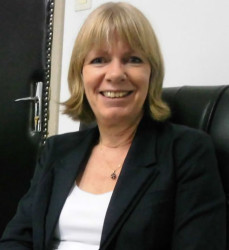The issue of children being sent to the New Opportu-nity Corps (NOC) for ‘wandering’ came up for discussion again on Friday and this time between UNICEF representative for Guyana and Suriname Marianne Flach and Minister of Legal Affairs Basil Williams.
Speaking to reporters at the Attorney General’s Chambers after holding discussions with Williams on a number of issues relating to children, Flach said UNICEF was disturbed that the majority of children at the NOC have been sent there for minor offences and other types of facilities need to be developed for these children.
“NOC, we think, is a good institution,” Flach said. “It is an open institution. It provides education to children. It is a correctional facility and not a prison and we should not refer to the students there as prisoners.”
Flach, who was part of a delegation that met the AG, told reporters, “We are concerned for instance that 75 % of the young people who are there are being locked up for wandering… and we think that should not be the case. There should be other correctional facilities… and they should be much closer to the family institutions.”

According to Flach, UNICEF’s position is that Guyana needs to look at solutions that are more family oriented. She said that if this is done then the number of children being sent to the NOC will be reduced paving the way for more attention to be paid to special needs and helping children in conflict with the law reintegrate into society subsequent to their release.
Child rights advocates have in the past called for the removal of criminal connotations to ‘wandering’ and over the years members of civil society have expressed concern at the conditions at the NOC. There have been reports of physical, emotional and sexual abuse.
Williams told reporters that the discussions centred on issues affecting children. He disclosed that certain proposals have already been made in relation to the educational rights of children. He said there were also discussions on the revamping of juvenile justice bill.
Additionally, the question of international law and family rights were also up for discussion, particularly since Guyana has cross border links and citizens who are married to nationals of other countries and issues such as child abduction, adoption, custody and maintenance would arise.
According to Flach, UNICEF raised other important issues including the juvenile justice bill and the family court, which it believes should be established soon, she said. With regard to the bill she said that a draft is available and UNICEF has been in discussions with the ministries concerned about their support for the bill. “And we hope that it will be introduced into Cabinet very soon,” she said.
This bill falls under the Ministry of Public Security. Back in July, when UNICEF representatives met Education Minis-ter Dr Rupert Roopnaraine, Public Security Minister Khemraj Ramjattan and Indigenous People’s Affairs Minister Sydney Allicock on issues affecting children in Guyana, the bill was among the things discussed.
Ramjattan, according to a press release penned following the meeting had indicated a readiness to begin preliminary discussions on the draft bill, as part of the preparations for Cabinet submission. He said that a few issues still needed to be fully discussed, including support for raising the age of criminal responsibility in Guyana from 10 years old, the removal of economic crimes such as wandering, and the need to ensure that the justice system has the appropriate treatment for children who need care and protection; those who are found wandering, and those who are in contact with the law as offenders.








